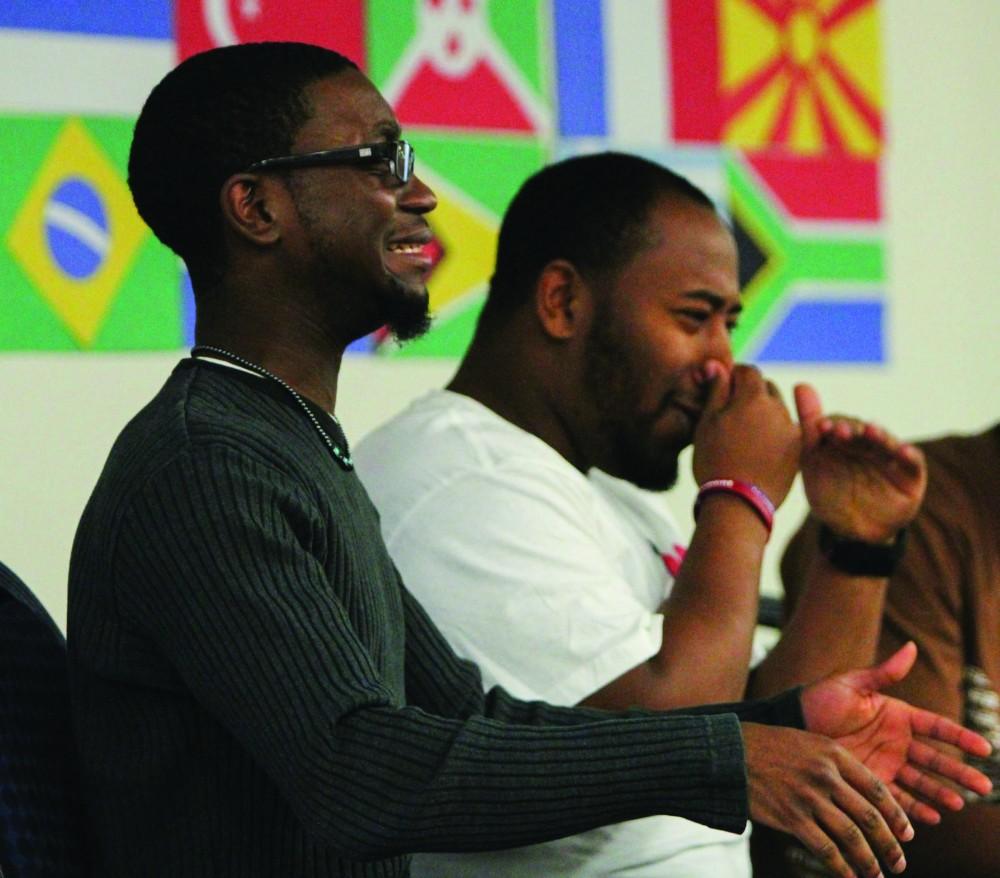We Are One exposes cultural stereotypes

GVL / Jessica Hollenbeck Students Dmitri Westbrook (left) and Jamar Ragland (right) from the Act on Racism group performs a skit during Monday night’s event “We are One”.
Nov 28, 2012
For those looking for a night of live performance, honest and open real life conversation and diverse food, they had to look no further than the Grand River Room and the We Are One cultural event.
Organized by Asian Student Union President Jerika Nguyen and sponsored by over 10 student organizations around campus, We Are One reached about 200 students and was aimed to teach students and faculty about cultural stereotypes and the damage they cause.
“I received a lot of feedback from the Office of Student Life and they approached me and told me that people are already thinking that the event should be a tradition,” Nguyen said. “I know in particular Ji Liu, who gave a speech for the International Student Organization, said his speech really helped him a lot and helped him to be more comfortable.”
The We Are One event gave members of different ethnic groups the opportunity to share common stereotypes that they have seen and also allowed them to tell those in attendance the impact they have had on their lives.
Alexandria Elliot of the Black Student Union spoke about the stereotype she is put into because she is African-American and from the city of Detroit.
“It means that if you are black, and you speak proper English, grow up in a two parent household, you and your siblings all have the same parents, your parents are still married, and you are the third generation from your family to go to college, you’re an alien,” Elliot said. “…I spend more time defending myself for where I come from than I do telling people what I want to do with my major after I graduate.
“But that’s fine, even if it is just my race. I will never stop not only telling people, but by showing them as well that I can be so much more than just a baby momma. That my brothers can be more than just rappers and gang bangers. That what you see on TV is not the Detroit that I grew up in.”
Another student who shared their story was Ji Liu, who is a foreign exchange student from China and is a part of the International Student Organization.
“Even before I came here, I’ve known that Chinese students are always pictured as geeks, amazingly good at mathematics in most American student’s eyes,” Liu said. “Though this is a typical stereotype, I’m not to offended by that at all. It can even be thought of as a compliment. I mean, it’s not too bad to be able to calculate as a calculator as long as you are not just a calculator.”
Liu shared that he felt that as a culture, we need to break down all the things that are standing in the way of those from different cultures becoming friends, including language.
“I have talked with a lot of Asian exchange students here at Grand Valley and most of them have said something similar: that they did try to make friends here until they finally lost their confidence and hope completely,” Liu said. “Then they just kept to themselves, never ever trying to talk to the people around them again. I am one of them. They are marginalized, just as how other races were isolated by racists in history.”
Other activities that took place during the night included a raffle for campus gift cards, a cultural pyramid game, free food and a live performance by GVSU’s Act on Racism.
While the event could be considered a success, Nguyen felt that students and faculty can still do more.
“Stereotypes aren’t limited to how others view you, they are also present with how you view yourself,” Nguyen said. “I would urge students to finally advocate cultural awareness, not just for others but also for themselves. I know there are a lot of students who don’t embrace their culture at all, or are ashamed or embarrassed at who they are or who their family is, so I would ask students to be aware of that.”























